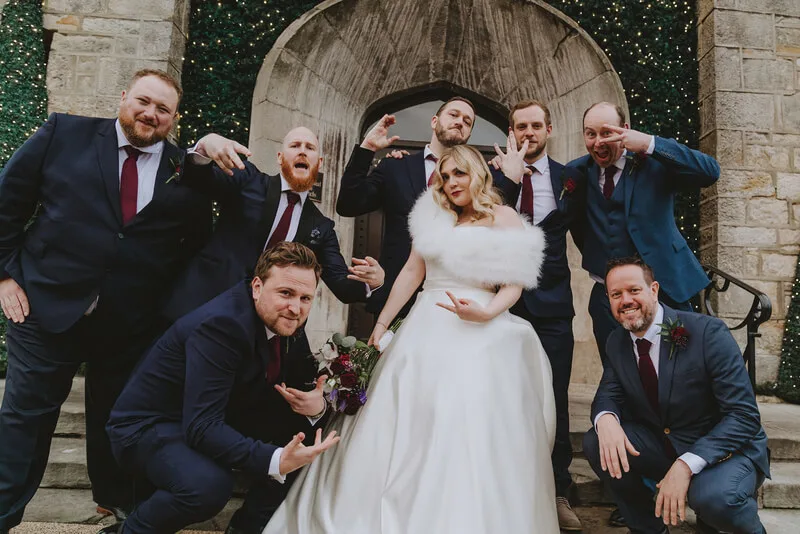How catching COVID-19 kept me out of Australia

I travelled home to Ireland for Christmas and promptly got COVID-19. I was prepared for the illness, but not the travel complications.
"Don't panic", my brother said, sounding slightly panicked. "One of the groomsmen has just tested positive for COVID. You should probably get tested, too." So began the unforgettable series of calamities that was my Christmas 2021.
Like many Australians with family overseas, I was excited to hear of the international borders reopening. COVID-19 had wiped out all my travel plans – and resulted in my brother having to cancel and re-schedule his wedding twice. December 2021, however, presented the perfect opportunity for a visit to Ireland with the wedding, my father's 70th birthday and Christmas all happening within a 2-week period.
COVID-19 cases were falling in both Australia and Ireland at the time – so as soon as I could, I booked a return ticket with Qantas. Little did I realise at the time that the Omicron variant, quietly bubbling away, was about to ruin my carefully planned visit.

The start of my trip home went swimmingly, with the birthday and wedding concluding without a hitch. It wasn't until 2 days after the wedding, as the final overseas guests were making their way across borders, that we found out there were positive cases. I went for a PCR test on 17 December and received a positive result the following day – the only person in my family to do so. I retired immediately to my parent's spare bedroom, lay down, and thought about having to stay there for the next 10 days.
Thankfully, my symptoms were relatively mild. I slept heavily for the first 4 days, had a slight cough and sore throat, but no fever. These are the classic symptoms of Omicron. The worst part about isolating was having to do it in a house full of other people – and having to reach out to someone every time I needed anything at all.
With my original return flights scheduled for 27 December, I knew I was going to have to postpone my trip back to Sydney. At the time, a negative PCR test was required in order to return to Australia. I knew that anybody who has recovered from COVID-19 could continue to test positive via PCR for several weeks – so I checked health.gov.au.
I was relieved to learn that Australian citizens could apply for an exemption to be allowed to travel with a positive PCR result, if they have recovered from COVID-19. This required a letter from a doctor stating that the traveller in question had indeed contracted and recovered from COVID, was no longer infectious and that the flight was at least 14 days after the original positive PCR result. Based on this, I was able to move my flight easily to 2 January.
I obtained the letter from the local doctor and was feeling fairly confident about travelling home, until the instructions on health.gov.au changed the next day. The site now said that the doctor's letter needed to state that the traveller had been free of symptoms for 14 days. As my symptoms didn't recede until 23 December, this would have required pushing the flight out again further.
The next day, thankfully, the government changed its advice again, and went back to the original requirement. I was relieved, until 5 minutes later when I received a message from my wife, directing me to the Qantas website.
Qantas, it turns out, had decided to make returning to Australia even more complicated by requiring travellers who have recovered to submit a separate clearance form, also to be signed by a doctor, 7 days before the flight. My flight was 9 days away, but it was Christmas Eve and doctor's offices were closed until early January. Thankfully, however, the local doctor agreed to digitally sign the Qantas form for me. Anyone who didn't have the ability to contact a doctor during the holidays would have been stuck. I, thankfully, was all set to travel.

In the end, spending Christmas Day in isolation was miserable, but emerging from that bedroom on 27 December was glorious. I still managed to spend time with family and have pints with friends in cosy Dublin pubs – albeit in a much more compressed format. I was even able to upgrade my return flights to business with Qantas Points, one of the best value ways of spending them.
I wasn't the only person who travelled to Ireland for Christmas, however. My wife, who I travelled with but was isolating from through much of the trip, tested positive on Christmas Day. Before she attempted to move her flight, Qantas changed its form – now requiring that it be signed by the doctor at least 14 days after the initial positive PCR test. This, combined with its 1-week processing time, necessitated a flight delay of 3 weeks.
Another friend of mine who travelled from Sydney to Cork for Christmas also got COVID and had to change his flights. Things were more complicated for him, as he booked his flights via American Express Travel – meaning he was required to call the travel agent during Sydney office hours to make changes. In the end, he bypassed Qantas's unnecessarily complicated requirement by shifting his flight to Emirates, which can process medical exemptions at the gate.
Right now, I'm just glad we're all back in Sydney. Thinking back on our experience, I realise we were all lucky on 2 fronts.
First, we were staying with family, so the extra weeks did not result in huge hotel bills. If you are looking to travel internationally any time soon, I'd highly recommend good travel insurance.
Secondly, rapid antigen tests – 12 of which I went through during my bout of COVID-19 – were easily available and relatively cheap ($5 each) in Ireland. I hate to think of the cost and difficulty of obtaining as many of them in Australia. (If you're looking for antigen tests, Finder is tracking where they are currently in stock around Australia).
Overall, if you're travelling internationally any time in 2022, I would recommend the following:
- Before you travel – get vaccinated and boosted. Nobody who had vaccine boosters at the wedding caught COVID.
- Check the full vaccination and test requirements of your destination, as well as the current Australian requirements at the time of your booking.
- Make sure that your airline allows free changes. Also, check that it has a number that operates during office hours in the country you are visiting.
- If you are booking via a travel agent, make sure they are available to make changes 24 hours a day.
- Bring a handful of antigen tests with you.
- And, most importantly – make sure you take out travel insurance that covers COVID-19-related costs.
Finder's Insights Blog examines issues affecting the Australian consumer. It appears regularly on finder.com.au.
Picture: Getty/Shutterstock
Ask a question
